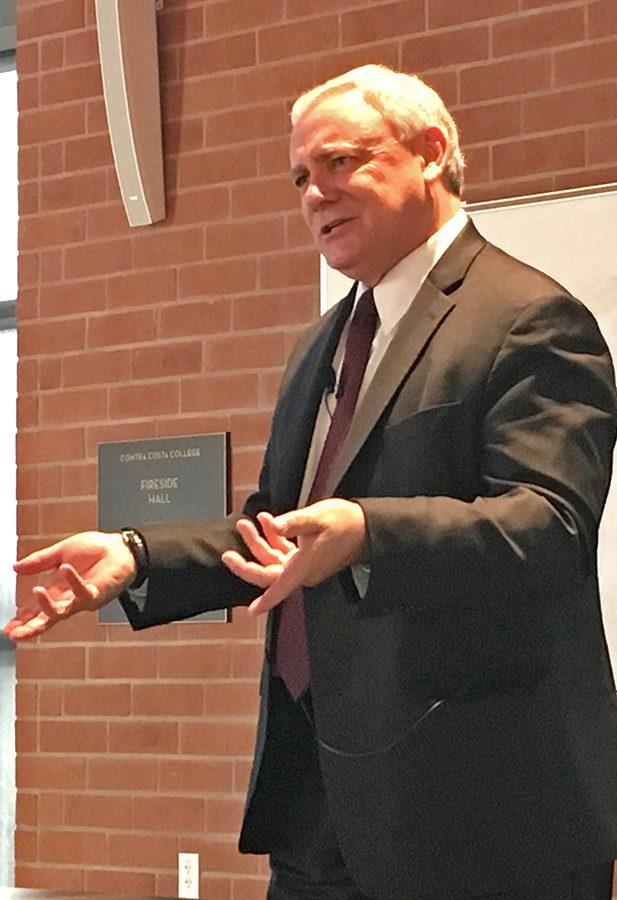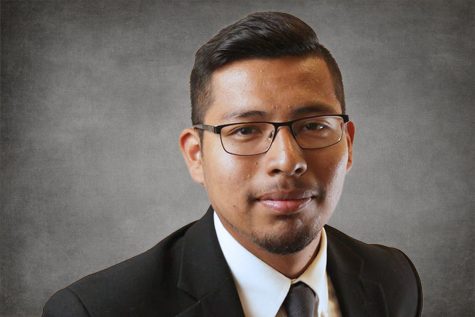Wood to retire in 2020
Chancellor decides to leave district after three years
Contra Costa Community College District chancellor finalist, University of Minnesota Chancellor Fred Wood speaks to the crowd in Fireside Hall on Monday.
Oct 9, 2019
Dr. Fred Wood will end his three-year run as Contra Costa Community College District chancellor this spring amid an atmosphere of racial tension in the district and a leadership conundrum at Contra Costa College.
Wood announced his retirement on July 17 in an email to colleagues saying his final day in service will be March 31.
Dr. Wood’s statement read in part, “While the Governing Board is disappointed, they understand and support my decision to retire after a career in higher education spanning 40 years because of personal obligations and my belief that the district is ready for new leadership.”
He said a fresh start for the district with a new chancellor is possible because of his accomplishments over the past three years.
“The district is in a great place,” Wood said.
Stable enrollment figures, a strong financial status and diverse programs reaching out to students around the district will establish a foundation for the next chancellor, Wood said.
“The colleges have begun their preparation for accreditation visits late next year and the migration to a new format for our district policies is underway,” he said.
“Our capital construction bond program is moving along well, stronger relationships are being developed with our educational and community partners and the Governing Board has just approved a new district five-year strategic plan,” Wood said.
But for Wood, a Martinez native, he chose to step away from district leadership to spend more time with his family. And as much as he will miss the friendships, the students and the people, he is ready for his next chapter, Wood said.
CCC Acting President Mojdeh Mehdizadeh recently said after a visit to Los Medanos College with Wood that she recognized the chancellor’s best quality.
“He’s a good listener,” she said.
The district was Wood’s first college experience. He attended Diablo Valley College as a student in the 1960s and transferred to UC Davis where he served in student government.
Most recently, Wood was the president of the University of Minnesota-Crookston until 2017 before accepting the chancellor position at the District Office.
The diversity breakdown at that college stands in stark contrast to how people are represented in the East Bay. Currently, in Crookston, out of 2,834 students only 115 are black, 141 are white and only 49 students identify as Asian.
History, anthropology and geography department Chairperson Manu Ampim said it’s no secret there is a level of resentment held by some administrators, staff and faculty in the district about decisions Wood and his administration made over the last three years.
“There was nothing in Wood’s background that prepared him to govern over an ethnically diverse district such as ours,” Ampim said.
There isn’t any malice involved, Ampim said, but there is no coincidence that there is a “chaotic environment” in the district during Wood’s tenure.
Controversies
The retiring chancellor is no stranger to controversy on college campuses. During the 2011 occupy Wall Street protests, students at UC Davis, where Wood served as vice chancellor, were subjected to enhanced pepper spray deployments by campus police officers.
The incident garnered national attention.
Wood came into this district right after the controversial death of John T. Nejedly, a Governing Board trustee, rocked the district. A year later, in March of last year, Wood made the controversial decision to transfer then-CCC president Mehdizadeh to her previous position in the district as executive vice chancellor of education and technology.
This decision removed stability from CCC and started a chain of events that has left leadership at the campus in flux, Ampim said.
A month later, a preliminary summary of a sexual harassment investigation, released Feb. 20 by district Associate Vice Chancellor and Chief Human Resources Officer Dio Shipp, outlined offensive behavior by then district Governing Board trustee Timothy Farley.
The investigation showed Farley “did engage in unlawful sexual harassment” three years prior at a vendor-sponsored dinner in Monterey, California, Shipp said.
The Governing Board accepted Farley’s resignation and Farley abruptly left the district, as reported previously by The Advocate.
That same month, Ampim said the African American Staff Association voiced concerns that courses involving African American subject matter were being disproportionately cut along with alarmingly low numbers of African American staff being hired at CCC.
The AASA laid out six areas of concern to the current college and district administration, and held meetings with Wood, in order to find meaningful solutions.
A resolution to the AASA concerns has yet to be reached and racial tension in the district continued to mount for the chancellor.
In March 2019, on two separate occasions, depictions of racist imagery were found in DVC rest rooms. The response from college administrators and the district sparked outrage at the Pleasant Hill campus.
Following the public outcry, Wood and DVC President Susan Lamb met to discuss the proper way to handle the situation. He recognized that students wanted information and when the district and the college administration took proper precautions, social media had already spread the information, Wood said during an interview in March.
The graffiti incidents at DVC highlighted a lack of communication, both physically or digitally, between district officials and students.
Wood said he is not the most knowledgeable person when it comes to technology and social media and it might be something that the new chancellor could do better.
For college professors like Ampim, not understanding social media can’t be an excuse to not use it.
“There are many talented people in the District Office who can be in charge of that,” Ampim said.
Wood’s style of leading the district lacks communication between students and the District Office, Ampim said.
The chancellor spends most of his time in the District Office. He is removed from day-to-day life at the campuses — the decisions he makes are based on meetings and presentations, Ampim said.
Hiring
There is a growing group of people who do not want to speak out publicly but hope intra-district politics don’t affect who is hired as the new chancellor, Ampim said.
He hopes that the whoever takes Wood’s place takes the time to get to know each campus and its diverse needs.
Two search firms responded to the Request for Qualification application the district posted when news of Wood’s retirement became public.
On Oct. 3, AGB Search, a higher education search group founded in 2010, and executive search group PPL, Inc., founded in 1978, gave presentations at a search-related meeting in the District Office in Martinez.



